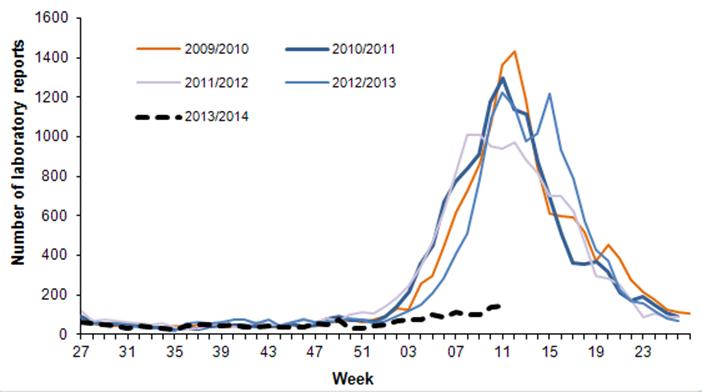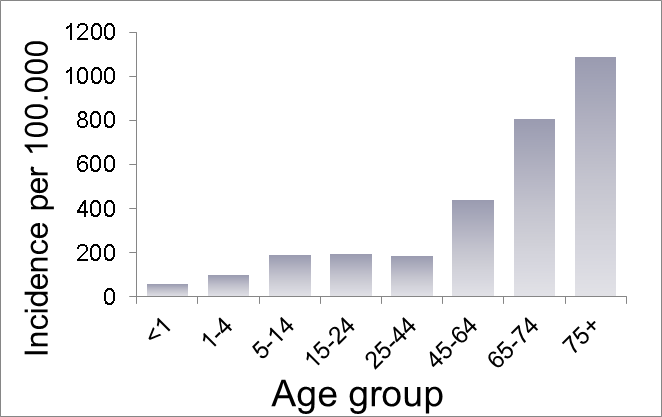After clean water, vaccination is the most effective public health intervention in the world for saving lives and promoting good health. Globally, we have one of the best immunisation programmes in the UK and we’re always at the forefront of rolling out new programmes when the best vaccination is available. This has definitely been the case over the past year – we introduced an impressive four new vaccination programmes in 2013/14 and are continuing to look at new opportunities. Earlier this year the Joint Committee on Vaccination and Immunisation (JCVI) recommended that we introduce a cost effective vaccination against meningitis B, and we look forward to hearing more about how this might be possible.
So how do we choose what to vaccinate against?
Diseases our grandparents used to fear and that were the norm in the UK are now in most cases rare and in some cases consigned to the past entirely. Polio was a real threat until 50 years ago and caused significant ill health and permanent disability to individuals struck with the infection, but now in the UK it is completely eradicated. This is entirely due to a successful vaccination programme.
However, the move toward eradicating various infections as a public health problem is not just as simple as producing a new effective vaccination. It only works if the uptake of the new vaccination is high, so we rely on the trust of people to accept a vaccination when it is offered.
One of the new vaccines introduced last summer is for rotavirus. Rotavirus is the most common cause of vomiting and diarrhoea (gastroenteritis) in infants and young children. Prior to the vaccination programme, nearly every child will have had at least one episode of rotavirus gastroenteritis by five years of age. In children younger than five years in the UK, this infection has been responsible for around 140,000 young children visiting the GP and 14,000 babies and young children being admitted to hospital every year, as well as 37,000 NHS Direct calls and 30,000 A&E attendances.
The rotavirus vaccination programme began on 1 July 2013 when children under four months were routinely vaccinated against this highly infectious illness. The vaccine is administered as a droplet into babies’ mouths during their two- and three-month vaccination appointments.
We are extremely pleased that so far the preliminary data show an excellent start to the uptake of the rotavirus vaccine and we are encouraged that this spells really good news for the future. From July 2013 to March 2014, 93 per cent of children in the survey we conducted had received the first dose of rotavirus and 88 per cent had completed the two dose course. The excellent news is that lab reports show there were 70 per cent fewer cases of rotavirus during the same period when compared to the average over the last 10 seasons. This graph shows the huge impact this vaccine has already had:
Another example of a new vaccine, we introduced in 2013 is shingles. The illness usually lasts two to four weeks and the first sign of the condition is a tingling sensation in the affected area, followed by pain and then a rash, usually on the chest. It mainly affects older adults as you can see clearly from the graph below:
For some people, however, shingles can be very serious – leading to intractable pain and, in a few of these people, death.
So far, nearly half the people who can have the vaccine have come forward to be immunised. We would like to see that improve of course, though, so we are continuing to support health care workers to take opportunities to promote this new vaccine to the 70 and 79 year-olds who are eligible.
The national vaccination programme is it is a massive joint effort: from the general public, the health service and private pharmaceutical companies. No single entity can take the credit for the fantastic social and medical advancements that have allowed our vaccination process to be so successful.
The main thing I always remember when thinking about the work we all do is that immunisation prevents serious illness and saves lives. What a great privilege it is to be part of that effort.
Featured image via PHE Image Library. Used under Crown Copyright



1 comment
Comment by Therese posted on
As someone who works in a skincare clinic I feel that sanitation is the most important part of our business and this begins with making sure that the right people get vaccinated at the right times.